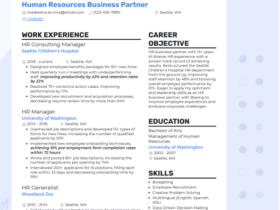What To Do When Your Curriculum Vitae (CV) Is Rejected; When you’re job hunting, the rejection of a CV can be a frustrating experience. It’s easy to take it personally, but it’s important to remember that there are many reasons why a CV might be rejected. Understanding why your CV was rejected and taking steps to improve it can help you stand out from the crowd and land the job you want.
One of the first things to do when your CV is rejected is to take a step back and assess the situation. It’s important to understand why your CV was rejected and to take steps to address any issues. This might include making changes to your CV, improving your skills, or expanding your network. By taking a proactive approach, you can increase your chances of success in your job search.

Key Takeaways
- Understanding why your CV was rejected is the first step in improving your chances of success.
- Taking a proactive approach, such as making changes to your CV, improving your skills, or expanding your network, can help you stand out from the crowd.
- By staying positive and persistent, you can increase your chances of landing the job you want.
Understanding CV Rejection
When a job seeker applies for a job, the first thing the employer sees is their CV. The CV is the applicant’s first impression and can make or break their chances of landing an interview. Unfortunately, many job seekers experience CV rejection. Understanding why CVs are rejected can help job seekers improve their CVs and increase their chances of landing their dream job.
Common Reasons for Rejection
There are many reasons why a CV can be rejected. One common reason is that the CV is too long. Employers receive hundreds of CVs for each job opening, and they don’t have the time to read through lengthy CVs. Another reason for rejection is that the CV is poorly formatted. A CV that is difficult to read or has spelling and grammar errors can be a turn-off for employers. It is important to ensure that the CV is formatted correctly and is free of errors.
Other common reasons for CV rejection include:
- Lack of relevant experience
- Too much irrelevant information
- Unexplained gaps in employment history
- Lack of accomplishments or achievements
The Role of Applicant Tracking Systems
Many employers use Applicant Tracking Systems (ATS) to screen CVs. ATS is software that scans CVs for keywords and phrases that match the job description. If a CV does not contain the necessary keywords, it may be rejected by the ATS, even if the candidate is qualified for the job.
To avoid rejection by ATS, job seekers should tailor their CVs to the job description. This means including keywords and phrases that match the job description. Job seekers should also use a simple and clean format for their CVs to ensure that the ATS can read them.
In summary, CV rejection is a common experience for job seekers. Understanding the common reasons for rejection and the role of ATS can help job seekers improve their CVs and increase their chances of landing their dream job.
Also read; 5 Must-Have Elements in Your Job Application Curriculum Vitae (CV)
Initial Response Strategies
When a CV is rejected, it is natural to feel disappointed and frustrated. However, it is important to handle the situation professionally and constructively. The following strategies can help job seekers respond effectively to a rejected CV.
Handling Emotional Responses
Receiving a rejection can be a blow to one’s self-esteem. It is important to acknowledge and process the emotional response before taking any action. Job seekers should take a break, practice self-care, and seek support from friends and family.
Seeking Constructive Feedback
To improve future job applications, job seekers should seek feedback from the employer or recruiter who rejected their CV. This can provide valuable insights into what went wrong and how to improve. Job seekers can send a polite email or make a phone call to request feedback. They can also ask specific questions such as:
- What were the strengths and weaknesses of the application?
- Was the CV missing any important information?
- Were there any red flags or concerns?
- How can the job seeker improve their chances in future applications?
By seeking constructive feedback, job seekers can turn a rejection into a learning opportunity and improve their chances of success in the future.
CV Improvement Techniques
When a job seeker’s CV gets rejected, it’s essential to take a step back and identify the weak points in the document. Here are some CV improvement techniques to help job seekers increase their chances of getting the job.
Tailoring Your CV to the Job Description
One of the most common reasons for CV rejection is a lack of customization. Job seekers need to tailor their CVs to each job they apply for. They should read the job description carefully and include relevant skills and experiences that match the job requirements. This will show the recruiter that the candidate has a genuine interest in the job and is a good fit for the role.
Highlighting Measurable Achievements
Recruiters are interested in candidates who can demonstrate their achievements. Job seekers need to include measurable achievements in their CVs. This could be in the form of numbers, percentages or any other metric that shows the impact of their work. For example, instead of saying “increased sales,” job seekers should say “increased sales by 20% in the first quarter.”
Ensuring Clarity and Readability
Job seekers need to make sure their CVs are clear and easy to read. They should use bullet points to break up long paragraphs and use a clear font that is easy to read. They should also avoid using jargon or technical terms that the recruiter might not understand.
Optimizing for Keywords
Many recruiters use Applicant Tracking Systems (ATS) to screen CVs. These systems use keywords to identify relevant candidates. Job seekers need to optimize their CVs for keywords. They should include relevant keywords from the job description throughout their CV. However, they should avoid keyword stuffing, which is the practice of adding too many keywords to the CV. This can make the CV unreadable and may result in rejection.
By following these CV improvement techniques, job seekers can increase their chances of getting the job they want.
Building Professional Skills
When a CV is rejected, it can be a frustrating experience. However, it can also be an opportunity to identify skill gaps and pursue professional development. Building professional skills can help increase the chances of getting hired for the next job application.
Identifying Skill Gaps
The first step in building professional skills is to identify skill gaps. A skill gap is a discrepancy between the skills required for a job and the skills possessed by an individual. To identify skill gaps, individuals can review job postings and compare the required skills to their own skills. They can also seek feedback from recruiters or hiring managers on why their CV was rejected and what skills they need to improve.
Once skill gaps have been identified, individuals can create a plan to address them. This plan may include pursuing professional development opportunities, such as taking courses or attending workshops, or seeking on-the-job training or mentorship.
Pursuing Professional Development
Pursuing professional development is a great way to build professional skills and address skill gaps. There are many options available for professional development, including online courses, workshops, conferences, and certifications.
Individuals can also pursue professional development through on-the-job training or mentorship. This can involve seeking out opportunities to work on projects that require new skills or seeking guidance from a more experienced colleague.
Overall, building professional skills is an important step in addressing skill gaps and increasing the chances of getting hired. By identifying skill gaps and pursuing professional development, individuals can demonstrate their commitment to professional growth and development.
Expanding Your Network
If a job seeker’s CV is being rejected, it may be time to expand their professional network. Here are a few ways to do that:
Leveraging Social Media
Social media platforms like LinkedIn, Twitter, and Facebook can be valuable tools for expanding a professional network. Job seekers can use these platforms to connect with people in their industry, join relevant groups, and participate in discussions. By sharing their professional achievements and interests, job seekers can attract the attention of potential employers and colleagues.
Job seekers should also consider creating a personal brand on social media. This can involve sharing content related to their industry, commenting on industry news, or posting original content. By doing so, job seekers can establish themselves as thought leaders in their field and attract the attention of potential employers.
Attending Industry Events
Attending industry events can be a great way to meet new people and expand a professional network. Job seekers should look for events related to their industry, such as conferences, trade shows, and networking events. They should also prepare ahead of time by researching the event and its attendees, and by preparing a short elevator pitch to introduce themselves.
Job seekers should also consider volunteering at industry events. This can be a great way to meet new people and gain valuable experience, while also demonstrating their commitment to their industry.
By leveraging social media and attending industry events, job seekers can expand their professional network and increase their chances of finding a job that’s the right fit for them.
Alternative Job Search Strategies
When a job seeker’s resume is rejected, it’s important to explore alternative job search strategies. Here are a few options that can help job seekers find new opportunities.
Exploring Different Industries
One strategy to consider is exploring different industries. Job seekers can use their skills and experience in a variety of fields. For example, someone with a background in marketing could look for opportunities in healthcare marketing or technology marketing. Job seekers can also consider industries that are growing, such as renewable energy or e-commerce.
To explore different industries, job seekers can start by researching companies in different fields. They can use job search engines to find job openings in their desired industries. They can also reach out to people in their network who work in those industries to learn more about the job market and potential opportunities.
Considering Freelance or Part-time Work
Another option is to consider freelance or part-time work. Freelancing can provide job seekers with the flexibility to work on their own schedule and take on projects that match their skills and interests. Part-time work can also provide flexibility, and can be a good option for job seekers who want to gain experience in a new field.
To find freelance or part-time work, job seekers can use job search engines that specialize in these types of jobs. They can also reach out to companies directly to inquire about freelance or part-time opportunities. Job seekers can also consider creating a profile on freelance platforms such as Upwork or Fiverr to find work opportunities.
Preparing for Future Opportunities
Rejection can be a tough pill to swallow, but it is important to remember that it is not the end of the road. Job seekers should use the feedback they receive from rejections as an opportunity to learn and grow. By taking the time to reflect on their experiences, job seekers can prepare themselves for future opportunities.
Continual Learning and Adaptability
One of the best ways to prepare for future opportunities is to focus on continual learning and adaptability. Job seekers should take the time to learn new skills and stay up-to-date on industry trends. This can be done by attending conferences, taking courses, or reading industry publications. By staying informed, job seekers can position themselves as experts in their field and increase their chances of success.
Staying Updated on Industry Trends
Another important aspect of preparing for future opportunities is staying updated on industry trends. Job seekers should be aware of the latest developments in their field and be able to speak to how their skills and experience align with these trends. This can be especially important when it comes to job interviews, as employers are often looking for candidates who are knowledgeable about the latest industry developments.
In summary, job seekers should use rejection as an opportunity to learn and grow. By focusing on continual learning and adaptability, as well as staying updated on industry trends, job seekers can position themselves for future success.
Frequently Asked Questions
How can I improve my CV after it has been rejected?
If your CV has been rejected, it is important to take a step back and assess what went wrong. Start by reviewing the job description and the requirements of the position. Compare these to your CV and identify areas where you can make improvements. Focus on highlighting your relevant skills and experiences, and tailor your CV to the specific job you are applying for. Consider seeking feedback from a professional career counselor or mentor to help you identify areas for improvement.
What are common reasons for CV rejection?
There are several common reasons why a CV may be rejected, including spelling and grammar errors, lack of relevant experience, and failure to tailor the CV to the job requirements. Other reasons may include formatting issues, unprofessional email addresses, and including irrelevant information. Make sure to proofread your CV carefully, and always tailor it to the specific job you are applying for.
How should I respond to a job application rejection email?
After receiving a job application rejection email, it is important to respond professionally and courteously. Thank the employer for their time and consideration, and ask for feedback if it is available. Avoid being defensive or confrontational, and instead focus on using the feedback to improve your job search moving forward.
Is it appropriate to ask for feedback after a CV rejection?
Yes, it is appropriate to ask for feedback after a CV rejection. In fact, seeking feedback can be a valuable tool for improving your job search and increasing your chances of success. When asking for feedback, be polite and professional, and avoid being defensive or confrontational.
What steps can I take if my resume is not getting shortlisted?
If your resume is not getting shortlisted, consider making some changes to improve your chances of success. Start by reviewing the job description and the requirements of the position, and tailor your resume to the specific job you are applying for. Focus on highlighting your relevant skills and experiences, and consider seeking feedback from a professional career counselor or mentor to help you identify areas for improvement.
How can I increase the chances of my CV being noticed by employers?
To increase the chances of your CV being noticed by employers, make sure to tailor it to the specific job you are applying for. Focus on highlighting your relevant skills and experiences, and consider including a cover letter that explains why you are a good fit for the position. Additionally, make sure your CV is well-formatted and free of spelling and grammar errors. Finally, consider networking and reaching out to employers directly to increase your chances of success.















Leave a Reply
View Comments